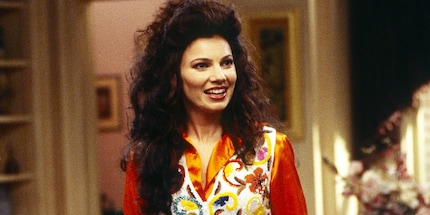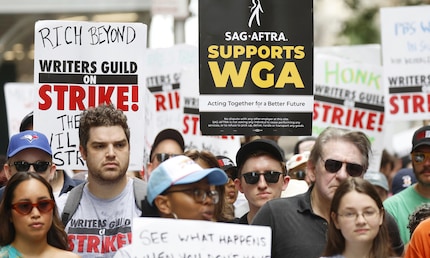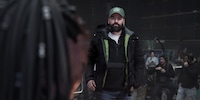
Background information
The Sky Switzerland boss on the new order: "HBO is important - but not the only decisive factor"
by Luca Fontana

The Screen Actors Guild has stopped going to work. They’ve joined the already striking screenwriters. This will have serious consequences, not only for Hollywood studios, but for the entire film and TV industry.
In May, screenwriters with the Writers Guild of America (WGA) started striking. Now actors across the industry have joined them. This came after weeks of negotiations with the Alliance of Motion Picture and Television Producers (AMPTP) failed to produce an agreement on improved labour conditions. This was announced by the Screen Actors Guild (SAG) on its official homepage.
We said we need a modern contract that addresses modern issues. They countered with business as usual: income Erosion. AI Exploitation. Abusive self-tape demands.
Now Hollywood is facing something it hasn’t seen since the 1960: a dual strike by the SAG and the WGA. The be all end all. But who stands to suffer?
At the heart of the negotiations lies the explosive growth of streaming services. Classic remuneration packages designed for linear television no longer work in the streaming age. The unions are therefore calling for a revision to the collective labour agreement, in particular royalties.
One example: when films or series are rerun on linear television, actors and writers receive a so-called residual fee for this. This revenue is increasingly disappearing in the age of streaming. Remuneration for streaming the same content, however, was never clearly regulated because Netflix and co. were still in their infancy when the employment contract was last revised.
Another important demand concerns the use of artificial intelligence (AI): while writers fear that it’ll take over their job, actors fear for their digital likenesses. Already today, AI is being used to digitally copy or rejuvenate the faces of celebrities, and in some cases even to place them on the bodies of other people. With the rapid development of deep fakes, speech generators, and other AI tools, the SAG fears that its members will be completely replaced. That’s why it’s calling for adequate regulation and fair compensation when films and shows use the digital likeness of their stars.
The impact of the SAG and WGA double strike will be enormous. Some talk about billions of dollars in losses for the entire industry. Because so far, several upcoming film and TV projects have already been postponed indefinitely due to the Writers Guild strike. Combined with this new actors’ strike, current productions are now also coming to a standstill.
And not just those.
The strike doesn’t just mean no acting, singing or stunts. It also means no interviews to market films. No reshoots. No re-recording dialogue that’s already been filmed. No dubbing animated films and series. No performance or motion capture. No controlling puppets and animatronics. And no appearances at conventions either, such as the next Comic-Con 2023 in Las Vegas. That’s why the entire cast of Oppenheimer, led by Cillian Murphy and Matt Damon, promptly walked out of the premiere when the strike was officially called yesterday.
Hollywood is at a standstill for the time being.
On both sides of the table, efforts were made to reach an agreement until the very end. On 30 June, when SAG’s collective bargaining agreement expired, the parties opted for a 12-day extension to avoid a strike. After the deadline passed Wednesday night without an agreement, SAG announced the strike and made it official early Thursday evening.
«After more than four weeks of negotiations, the Alliance of Motion Picture and Television Producers (AMPTP) […] remains unwilling to offer a fair deal on the key issues[…],» union president and The Nanny star Fran Drescher wrote in an official statement. She calls the AMPTP proposals «insulting and disrespectful». The AMPTP represents major studios such as Amazon, Disney, NBC Universal, Netflix, Paramount, Sony and Warner Bros. Apparently, they simply refused to engage meaningfully and negotiate in good faith.

In its own statement, the AMPTP said it was «deeply disappointed» with the outcome of the negotiations. «This is the Union’s choice, not ours. In doing so, it has dismissed our offer of historic pay and residual increases, substantially higher caps on pension and health contributions […] a groundbreaking AI proposal that protects actors’ digital likenesses, and more,» the statement continues. According to them, the Guild has now set all of Hollywood on a course that would cause financial hardship to thousands who depend on the industry for their livelihood.
Which side will give in first is hard to predict. It’s true, Hollywood studios are already complaining about a drop in sales. However, it’s also certain that the trade unions’ coffers won’t be able to cover their members’ loss of income indefinitely. What’s more, Hollywood’s studio bosses are quite willing to stoically sit out a double strike – even if it drags on for months.
At least that’s what a studio insider told the reliable industry magazine Deadline. «I think we’re in for a long strike, and they’re going to let it bleed out,» the source said. Another confirmed, «The endgame is to allow things to drag on until union members start losing their apartments and losing their houses. […] a cruel but necessary evil.»

Apparently, Hollywood’s studio bosses have no plans to resume talks of their own accord before the end of October. Other sources close to the studios and streaming services apparently confirmed this to Deadline. Attrition as a tactic had been planned long in advance after the 100-day authors’ strike in 2007, should there ever be another similar strike. Previously, this had already successfully split the otherwise united front between the SAG, the WGA and the DGA – the Directors Guild of America.
It’s quite possible that the pressure on screenwriters and actresses will ultimately become too great. Not just because viewers want to see new movies in theatres and new seasons of their favourite shows on Netflix and the like. But also because the entire entertainment industry depends on Hollywood. CGI artists and production designers, for example. Or make-up artists, sound technicians, assistants and set builders. Even Starbucks employees who sell coffee inside studios fear for their financial security. Just like the cinema operators still suffering from the pandemic, along with their staff. It’s one big rat king.
The SAG, meanwhile, has nothing to offer but slogans of perseverance. One statement reads, «Our ninety-year history is a testament to what can be achieved through our conviction and unity. For the future of our profession, we stand together.»
Will this be enough to see them through?
Header image: Keystone-SDA/Etienne Laurent
I write about technology as if it were cinema, and about films as if they were real life. Between bits and blockbusters, I’m after stories that move people, not just generate clicks. And yes – sometimes I listen to film scores louder than I probably should.
Interesting facts about products, behind-the-scenes looks at manufacturers and deep-dives on interesting people.
Show all
Background information
by Luca Fontana

Background information
by Luca Fontana

Background information
by Luca Fontana